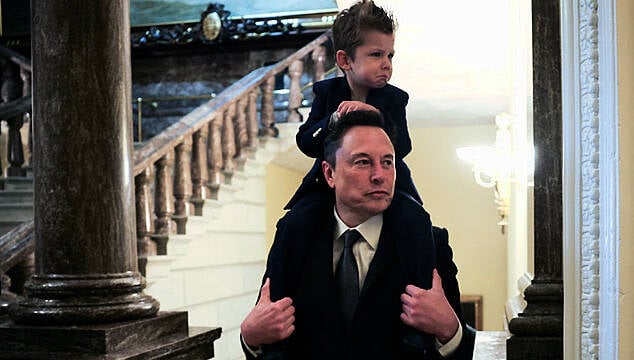Billionaire Elon Musk and former presidential candidate Vivek Ramaswamy met on Thursday with Republican lawmakers whose support they will need to win the sweeping spending cuts that US president-elect Donald Trump has asked them to find.
The two entrepreneurs have been named by Mr Trump to a task force that aims for a sweeping overhaul of the US government, which spent $6.8 trillion in the most recent fiscal year.
Mr Musk has set a target of $2 trillion in savings, though he has not said whether that would come in a single year or over a longer period. The two chairs of the "Department of Government Efficiency" have called for firing thousands of federal workers, slashing regulations and eliminating programmes whose authorisation has expired, such as veterans' healthcare.
That could be easier said than done. Any changes to veterans' benefits or other popular programs that serve millions of Americans would likely encounter fierce blowback, and efforts to thin the workforce could disrupt everything from law enforcement to air traffic control.
Mr Musk, clutching the hand of a small child, rushed down the corridors of the Capitol near the Senate chamber while surrounded by police, reporters and photographers.
Fears for Medicare and Medicaid
After being peppered with questions about whether he would support cuts to entitlement programmes like Medicare and Medicaid and cuts to defence, Mr Musk finally replied: "I think we just need to make sure we spend the public's money well."
Asked about getting rid of electric vehicle tax credits, Mr Musk said: "I think we should get rid of all credits."
Mr Ramaswamay met separately with a group of Senate Republicans including Thom Tillis, who said he believed there were "tens of billions of dollars" in spending that could be quickly clawed back.
As co-chairs of the efficiency task force, Mr Musk, the billionaire CEO of Tesla and SpaceX, and Mr Ramaswamy, a former biotech executive, would likely have to work with Congress to secure significant reductions.
Republicans will control both chambers of Congress and the White House next year, but they may struggle to win significant reductions. While lawmakers sign off on roughly $1.7 trillion in defence and domestic programmes each year, most federal spending consists of health, pension and other benefit programmes that lie outside of the annual budget process. Lawmakers have no control over interest payments, which are projected to top $1 trillion in this fiscal year.
Republican lawmakers have said they are eager to cooperate. Representative Marjorie Taylor Greene, a hard-right firebrand, will chair a House of Representatives panel to work with Mr Musk and Mr Ramaswamy, and Senate lawmakers have also expressed openness to the idea.
Republicans secured limited spending cuts in a 2023 showdown with Democratic president Joe Biden but have been unable to agree on further reductions since then.
Trump shows little interest in spending cuts
Mr Trump has broken with conservative orthodoxy by saying he will not cut benefits for the Social Security pension plan or the Medicare health plan for seniors, which together account for more than one-third of federal spending.

Mr Trump also showed little interest in spending cuts during his first 2017-2021 term in office, when federal expenditures grew from $4 trillion to $6.2 trillion.
Congress did not act on his proposal to eliminate more than a dozen small government agencies and failed to repeal Democratic president Barack Obama's signature Affordable Care Act, a central goal of the party.
Mr Ramaswamy said on Wednesday that the Trump administration should first try to find savings by reducing waste, fraud and abuse in benefit programmes like Social Security before asking lawmakers to consider more difficult reforms.
"We're taking on a very big problem here and we're going into it with an appropriate level of humility," he said at the Aspen Security Forum in Washington. (







